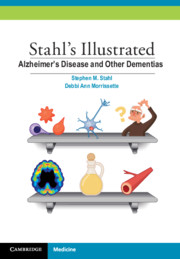Book contents
- Frontmatter
- Dedication
- Preface
- Contents
- CME Information
- Objectives
- Introduction
- Chapter 1 Alzheimer’s Disease
- Chapter 2 Lewy Body Dementias and Other Synucleinopathies
- Chapter 3 Frontotemporal Lobar Degeneration and Tauopathies
- Chapter 4 Other Dementias
- Chapter 5 Treatment of Secondary Behavioral Symptoms of Dementia
- Summary
- References
- Index
- Optional Posttest and CME Certificate
Introduction
Published online by Cambridge University Press: 19 October 2021
- Frontmatter
- Dedication
- Preface
- Contents
- CME Information
- Objectives
- Introduction
- Chapter 1 Alzheimer’s Disease
- Chapter 2 Lewy Body Dementias and Other Synucleinopathies
- Chapter 3 Frontotemporal Lobar Degeneration and Tauopathies
- Chapter 4 Other Dementias
- Chapter 5 Treatment of Secondary Behavioral Symptoms of Dementia
- Summary
- References
- Index
- Optional Posttest and CME Certificate
Summary
The term “dementia” describes a collection of symptoms including cognitive dysfunction, memory loss, language and communication issues, and behavioral symptoms such as agitation. There are numerous causes of dementia ranging from neurodegenerative disorders to excessive alcohol use. Over 35 million individuals, worldwide, have some form of dementia. Alzheimer's disease is by far the most common cause of dementia, followed by vascular dementia and Lewy body dementia; however, many individuals present with pathological characteristics of more than one dementia (i.e., “mixed dementia”).
Although dementia risk increases significantly with age, dementia is not necessarily an inevitable consequence of getting older. Furthermore, while many forms of dementia (including Alzheimer's disease, frontotemporal lobar degeneration, and dementia with Lewy bodies) are irreversible, approximately 9% of individuals with dementia have potentially reversible conditions (e.g., vitamin deficiency; depression).
In the following pages, we will describe the most common causes of dementia, review best practices for differentially diagnosing dementia, as well as management strategies to help improve quality of life for patients with dementia as well as the individuals who care for them. Chapters 1–4 describe the various types of dementia including their pathological and molecular substrates, which are often quite complex. We encourage all readers to refer to Chapter 5 (Treatment of Secondary Behavioral Symptoms of Dementia) for strategies to address the most common and often troublesome symptoms that are shared among many types of dementia (Alzheimer's Association, 2017; Maloney and Lahiri, 2016; Torrisi et al, 2017; Goodman et al, 2017).
- Type
- Chapter
- Information
- Stahl's Illustrated Alzheimer's Disease and Other Dementias , pp. xiii - xivPublisher: Cambridge University PressPrint publication year: 2018

